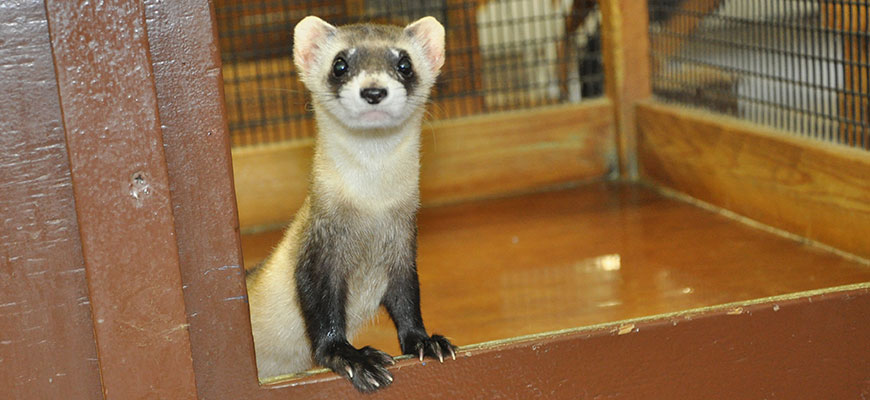CONTACT: Kyle Shepherd
Direct: 502-238-5331 | Media Only: 502-744-5639
kyle.shepherd@louisvilleky.gov
The Louisville Zoo is proud to celebrate its commitment to black-footed ferret conservation as it recognizes the 25th anniversary of its Black-Footed Ferret (BFF) Conservation Center.
The program started in 1990 with the building of the Center on the Zoo’s campus. The first kits bred there were born in 1991. A proud participant in the reestablishment of the black-footed ferret into its native Great Plains habitat, the Zoo’s Conservation Center has produced over 1000 kits and provided over 700 ferrets for reintroduction. The Conservation Center’s success is due, in no small part, to the dedication of keeper Guy Graves, who has been with our program from the beginning. Graves’ long term involvement has allowed him to gain a keen insight into the habits and behaviors of the ferrets under his care, and with this knowledge he has made valuable contributions to the program. Other facilities often rely on expertise shared by Graves’ to help them solve new issues or problems that develop. “It has been a pleasure working with this species and seeing this Center flourish to contribute 706 kits to be reintroduced in to the wild,” Graves humbly stated. “To have been a part of something from its origin is quite special and I am so glad to have had the opportunity.”
Louisville Zoo Director John Walczak added that “Conservation is the soul of modern Zoos. We are very honored to be a part of such an important project. To bring a species back from the brink of extinction is very special work. It is a point of pride for our city and our Zoo that we are only one of just six organizations contributing to the revitalization of an entire species!”
To join in the 25th anniversary celebration, Graves and Walczak will be going to Holly, Colorado to observe and participate in the release of ferrets on Nov. 12. They will share their observations through a blog posted on the Zoo’s webpage at www.Louisvillezoo.org/bff.
In 2014, the BFF Conservation Center celebrated a milestone — the birth of the 1000th kit. The kit was named “JoGuy” for longtime black-footed ferret keepers Graves and Joanne Luyster, as well as black-footed ferret reproduction pioneer JoGayle Howard. “JoGuy” was born to dam “Rhianna” and sire” Fettuccine” on June 10, 2014. JoGuy was released in Colorado in the fall of 2014.
Black-footed ferrets (BFFs), once thought to be extinct and long considered one of North America’s most endangered mammals, were reduced to only 18 animals in 1987. Faced with almost insurmountable odds, BFFs bounced back from the brink of extinction through the efforts of a multi-institutional recovery program. Current captive breeding sites include USFWS’s Ferret Conservation Center in Colorado, which houses the majority of black-footed ferrets, as well as Louisville Zoo, Cheyenne Mountain Zoo, National Zoo’s Science and Conservation Breeding Institute, Phoenix Zoo, and Toronto Zoo. There are 21 reintroduction sites scattered across the North American Plains including Canada and Mexico.
For more information on black-footed ferret recovery, check out conservation stories on the Zoo’s website at www.louisvillezoo.org or visit www.blackfootedferret.org.
About Black-footed ferrets
Considered one of the rarest mammals in North America, the black-footed ferret (BFF) is a solitary, nocturnal mustelid that populated the Great Plains from Canada to Mexico inhabiting the burrows of its primary prey, the prairie dog. Habitat destruction and government-sponsored poisoning of prairie dogs decimated the ferret population, once estimated at 500,000. The black-footed ferret was declared extinct in 1979, but a remnant population was discovered in Meeteetse, Wyoming in 1981. Biologists studied the ferrets, and when the population drastically declined in 1985 due to outbreaks of canine distemper virus and sylvatic plague, the last 18 black-footed ferrets were captured and placed in a managed breeding program.
# # #
The Louisville Zoo, a non-profit organization and state zoo of Kentucky, is dedicated to bettering the bond between people and our planet by providing excellent care for animals, a great experience for visitors, and leadership in scientific research and conservation education. The Zoo is accredited by the American Alliance of Museums (AAM) and by the Association of Zoos and Aquariums (AZA)

